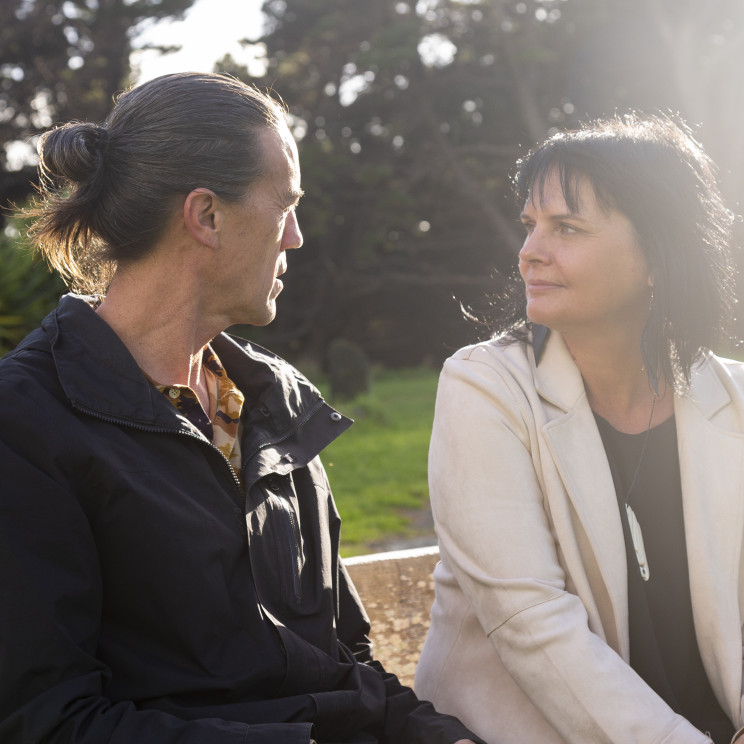Read about what pancreatic cancer is, types of pancreatic cancer, risk factors for pancreatic cancer and symptoms of pancreatic cancer.
Download the whole pancreatic cancer booklet
Our new booklet 'Understanding pancreatic cancer' is available now.
Download Section One of our pancreatic cancer booklet: Understanding pancreatic cancer
- The pancreas is part of your digestive system and sits behind your stomach. It has three parts: the head, the body, and the tail.
- The pancreas has two jobs:
- It makes digestive juices (enzymes) that help to break down the food you eat.
- It helps to make the hormones, insulin and glucagon, that control the level of sugar in your blood.
- Pancreatic cancer is cancer that starts in the pancreas. There are two types of pancreatic cancer: pancreatic adenocarcinoma and pancreatic neuroendocrine cancer. The most common type is adenocarcinoma (95%
of all pancreatic cancer). - Pancreatic cancer is hard to diagnose early. Symptoms often do not occur until the cancer has become large or has spread to other parts of the body.
- Symptoms may include:
- pain or discomfort in your tummy (abdomen) that may spread to your back
- unexplained weight loss
- jaundice (yellowing of skin and/or whites of eyes, dark pee [urine] and itchy skin)
- fatigue (no energy)
- a new diagnosis of diabetes without weight gain
- changes to bowel habits (pale poos [faeces] that float)
- feeling and being sick (nausea and vomiting)
- loss of appetite
- These symptoms can be caused by conditions other than cancer. That is why it is important to have your GP or whānau doctor check any of these symptoms.
- He wāhanga te repetaiaki huka o te pūnaha kūnatu me tana noho ki muri i tō puku. E toru ngā wāhanga: te upoko, te tinana, me te whiore.
- E rua ngā mahi a te repetaiaki huka.
- he mahi i ngā tarawai (pūmua whākōkī) e āwhina ana i te wāwāhitanga o ngā kai ka kainga e koe
- he āwhina ki te mahi i ngā taiaki, me te kurukakona e whakahaere ana i te rahi o te huka kei roto i tō toto.
- He momo matepukupuku te matepukupuku repetaiaki huka ka tīmata ki roto i te repetaiaki huka. E rua ngā momo matepukupuku repetaiaki huka: te matepukupuku repetaiaki huka pukumarere me te matepukupuku repetaiaki huka iotaiaki. Ko te matepukupuku e kitea nui ana ko te Matepukupuku repetaiaki huka pukumarere (e 95% o ngā matepukupuku repetaiaki huka katoa).
- He uaua ki te whakatau moata i te matepukupuku repetaiaki huka. Kāore ngā tohumate e tino puta kia rahi rā anō te matepukupuku, kia hōrapa rānei ki wāhi kē o te tinana.
- Tērā pea ka puta ko tētahi o ēnei tohumate:
- He mamae, he auhi rānei ki roto o tō puku tērā pea ka hōrapa ki tō tua
- He ngaronga taumahi tinana,
- hūhunu (ka kowhai haere te kiri, ngā wāhi mā o te whatu rānei, ka pāpango te mimi, ka māeneene te kiri),
- ka ngenge (kore kaha)
- he whakatau mate hou o te matehuka engari kīhai he pikinga taumaha
- rerekētanga ki ngā mahi tiko (horotea te tae o te hamuti me tōna taupua haere)
- te rongo i te hia ruaki (te whakapairuaki me te ruaki)
- kore hiakai

What is the pancreas?
The pancreas is part of your digestive system and sits behind your stomach. It has three parts: the head, the body, and the tail.
The pancreas has two jobs:
- It makes digestive juices (enzymes) that help to break down the food you eat.
- It helps to make the hormones, insulin, and glucagon that control the level of
sugar in your blood.
What is pancreatic cancer?
Pancreatic cancer is cancer that starts in the pancreas. There are two main types of pancreatic cancer.
- Pancreatic adenocarcinoma. Cancer starts in the cells that help to break down food (95% of all pancreatic cancers).
- Pancreatic neuroendocrine cancer. Cancer starts in the cells that make hormones (5% of all pancreatic cancer).
The two types of pancreatic cancer are treated differently and have different outlooks (prognoses).
Your specific type of pancreatic cancer needs to be diagnosed to help you decide on the best treatment for you.
What are the risk factors for pancreatic cancer?
Anything that can increase your chance of cancer is called a risk factor.
Risk factors for pancreatic cancer that we know make some people more at risk include:
- Smoking tobacco, including, cigarettes, cigars and pipes
- A history of diabetes
- Being overweight
- Chronic pancreatitis
- Workplace exposure to certain chemicals
- Older age
- Male gender
- Family history
- Inherited syndromes.
Symptoms of pancreatic cancer
Pancreatic cancer is hard to diagnose early. Symptoms often do not occur until the cancer has become large or has spread to other parts of the body.
Symptoms may include:
- pain or discomfort in your tummy (abdomen) that may spread to your back
- unexplained weight loss
- jaundice (yellowing of skin and/or whites of eyes, dark pee [urine] and itchy skin)
- fatigue (no energy)
- a new diagnosis of diabetes without weight gain
- changes to bowel habits (pale poos [faeces] that float)
- feeling and being sick (nausea and vomiting)
- loss of appetite.
These symptoms can be caused by conditions other than cancer. That is why it is important to have your GP or whānau doctor check any of these symptoms.
